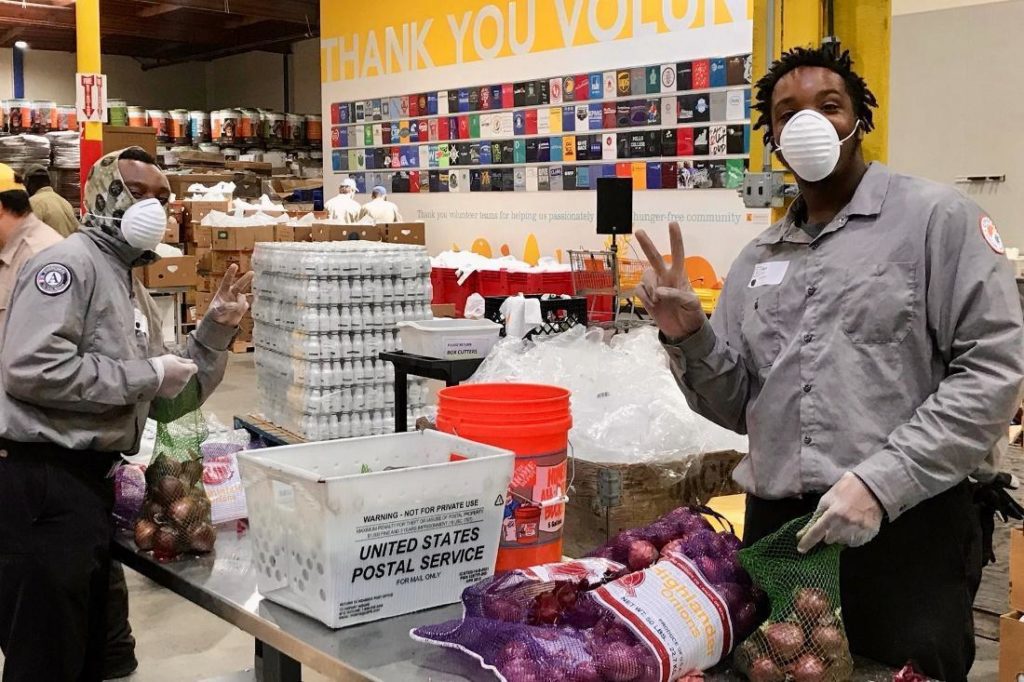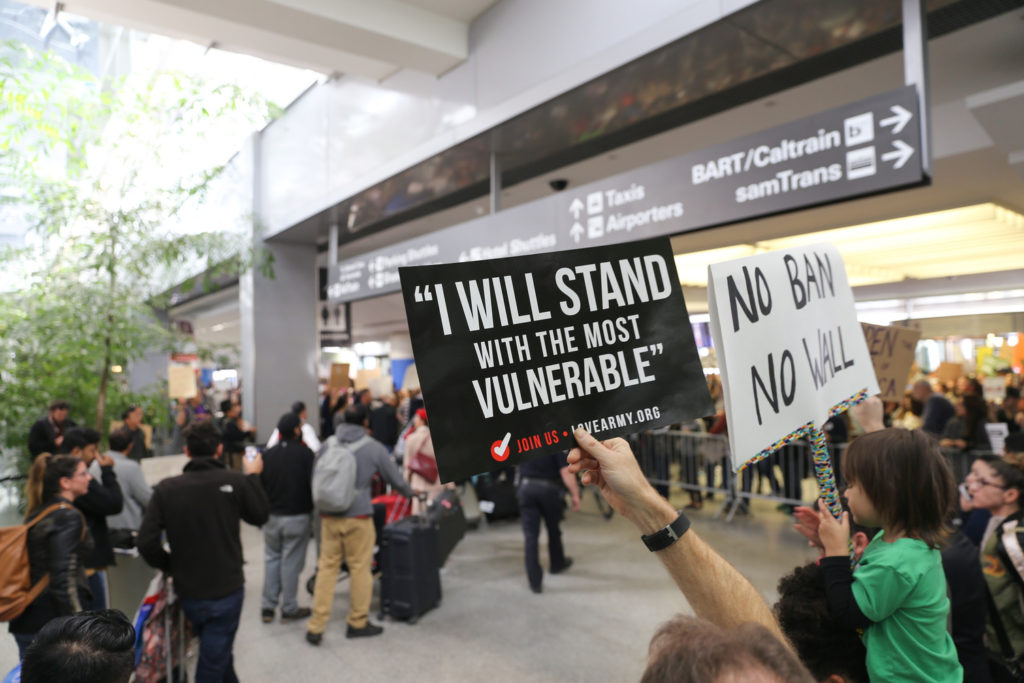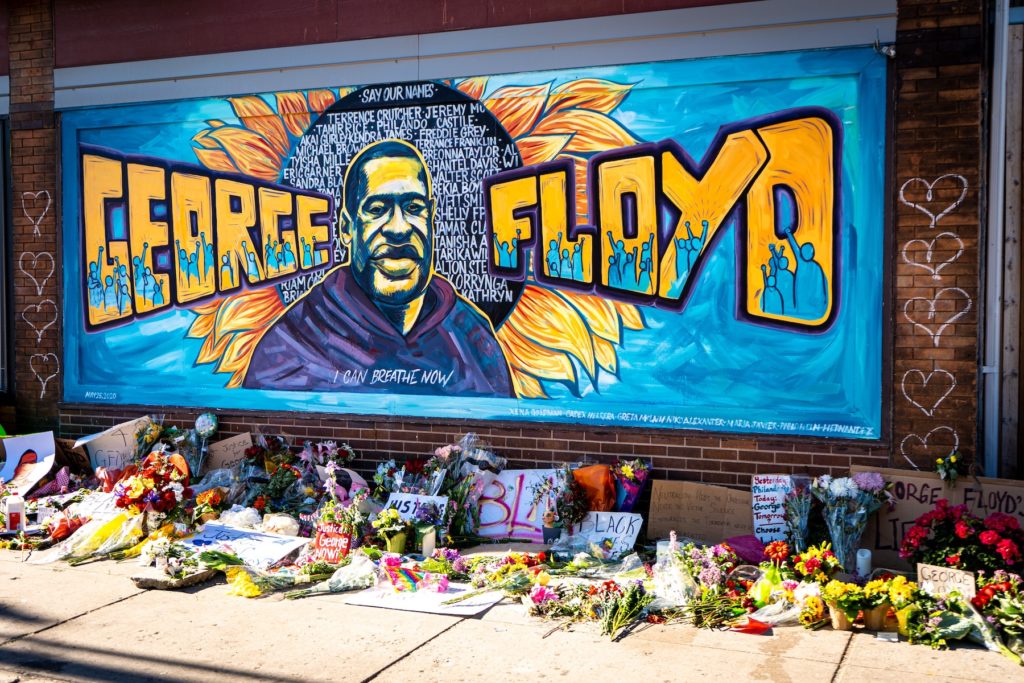To respond to movements, you need to be quick.
Myra Chow, former SFF senior director, Power Pathway

A Rapid Response to Community Emergencies
Wednesday, March 11, 2020: just two days earlier, SFF staff watched—from our office’s 14th-floor kitchen window—the Grand Princess cruise ship sail into the Port of Oakland with 21 confirmed cases of COVID-19. “I remember telling the staff that we were doing everything that we could do to flatten the curve and to keep employees at the foundation safe and healthy and that we were going to close down and go to remote work for a couple of months,” CEO Fred Blackwell says.
Overnight, we pivoted our operations so that most staff could work remotely. We collaborated via Zoom and documents in the cloud. We got to see each other’s kids, pets and homes. All the while, an essential crew continued to go to the office every week to check our mail, issue grants, and ready our office for the rest of us to eventually return in person.
But far more complicated than changing our internal operations was adapting the way we worked with a community that was reeling like never before from a global pandemic—and the jobs, homes, and lives that it affected.
On March 18, 2020, two days after the Bay Area issued its shelter-in-place order—the first in the country—SFF established our COVID Emergency Response Fund to assist nonprofits providing support for workers, food and housing assistance, as well as those addressing the sudden spike in attacks on Asian Americans. There was no time to waste. Grant applications that used to take months to review were now speedily processed. And instead of issuing paper checks, we quickly shifted to issuing electronic grant payments.
In a nutshell, the pandemic forced us to do better and faster. Our communities were depending on us.
The Lessons of 2016

There was one thing in particular that helped us move quickly when COVID hit. That was our response to an earlier community emergency: the 2016 election of President Donald Trump and the policies his administration immediately introduced. The new threats, such as the Muslim ban and the rescinding of the Deferred Action for Childhood Arrivals (DACA) program, required swift mobilization to protect communities in the Bay Area.
The 2014 murder of Michael Brown by a police officer in Ferguson, Missouri, helped ignite the Black Lives Matter movement, which included a number of protests in the Bay Area. In this context, former foundation fellow Jazmin Segura and senior director of the Power Pathway Myra Chow began designing a new grant program for grassroots organizers in the Bay Area.
They called it the Rapid Response Fund for Movement Building. Unlike our other grant applications, this new fund would require applicants to answer only four questions, and if a grant was approved, the check would be issued within 30 days. This new streamlined approach recognized that community organizers were busy on the front lines and didn’t have the time or staffing for onerous grant applications. And the issues they were working on couldn’t afford to wait months for funds to arrive. The small grants that the fund would issue would also allow us to get to know new, small groups and better understand what was happening on the ground.
Segura, Chow, and colleagues planned to introduce the new fund in January 2017, but it soon became clear that the Rapid Response Fund itself needed a rapid response. “I was sitting at SFO, talking to Judith [Bell],” says Chow, recalling a conversation she had with our chief impact officer two days after Trump’s election. Chow was on her way to Atlanta to attend the Race Forward conference, a national gathering of racial justice organizers. “We’ve gotta launch,” she recalls telling Bell. “And Judith made it happen.”
On November 17, eight days after Trump was elected, our first rapid turnaround fund opened to applicants. In its first 18 months, the fund issued 70 grants totaling more than $800,000, predominantly to organizations protecting immigrants during a new and terrifying era for our communities. We issued grants to groups including the California Immigrant Youth Justice Alliance (CIYJA), which conducted Know-Your-Rights training for undocumented immigrants who were suddenly at greater risk of deportation under Trump’s new policies.
In its first five years, the Rapid Response Fund provided $2.4 million in grants to more than 200 small grassroots organizations working on the front lines of racial equity in the Bay Area. All the while, it has been expertly led by foundation fellows Segura, JC De Vera, Joshua Lee and Eduardo Gonzalez, who have all been part of our Power Pathway team that leads our work on mobilizing communities in the Bay Area.
“We want people to know that part of our democracy is to engage people, and we wanted to support people expressing their opinions in a public way,” Chow says. “Which protest is—in its finest form.”
A Racial Reckoning

While the Bay Area continued to struggle through an unprecedented virus and grueling economic slump in 2020, it also faced the racial reckoning that shook the nation in the wake of the murders of George Floyd, Breonna Taylor, Ahmaud Arbery and many other Black Americans.
While systemic oppression and police brutality have plagued communities of color for centuries in America, Floyd’s death cracked open a deep mourning and unprecedented dialogue worldwide.
At SFF, the overwhelming need to gather together, process the event and support one another was no different. Seven days after Floyd’s murder, we held a virtual healing circle for staff. “You could see the emotion,” Michelle L. Myles Chambers, FAITHS senior program officer, recalls. “It was hard, but it was real.” Staff were invited to come together, share thoughts and emotions, and have an open conversation. “I’d have to say it was the most real moment I experienced with my colleagues,” says Chambers, who joined SFF more than 20 years ago. “And it was to me a turning point in the organization.”
Although Blackwell was already deeply committed to placing racial equity at the forefront of our agenda, 2020 marked a galvanizing moment in his leadership. It was impossible to ignore—true before Floyd’s murder, but even more widely understood afterward—that centering Blackness was essential in the fight for a more just and equitable Bay Area.
Recover, Reimagine, Rebuild
Pushing for an equitable recovery from the many hits of 2020–2021 required candid conversations—not just about race but also about economics. As Blackwell illuminates, “[There is] a ‘K-shaped’ economy that emerged from the pandemic.” On the upper part of the K are people who can work from home and invest in the stock market. While the economy took off for those people, SFF is intentionally focused on building with the communities and people on the bottom part of that K for whom the economy is decidedly not working. These people, doing poorly before the pandemic, were—during the immediate recovery phase—doing worse.
To mitigate these hardships, our board quickly approved an increase in spending from our endowment, unlocking another $10 million in grant support to be disbursed over five years, dedicated to supporting organizations led by and working in communities of color and focused on organizing and advocacy. As Blackwell says, “Our aspirations need to be higher than just returning back to normal, because normal wasn’t working for so many Americans and people of color.”
The increased grant budget enabled us to commit significant grant dollars to the Black community in the Bay Area and statewide. In February 2021, we committed $1 million to the California Black Freedom Fund to ensure that California’s Black-led organizing efforts have the sustained investments and resources they need to eradicate systemic and institutional racism. In October 2021, we also announced our seed support for three exciting new efforts: the Bese Saka initiative, which supports Black-led organizations in the Bay Area; Activate California, which is mobilizing the Asian American and Pacific Islander communities throughout the state; and the Latinx Power Fund, which supports power building in Latinx communities across the region and state.
Because 2020 and 2021 played host to a deadly virus, economic upheaval and a racial reckoning, the years hardly seemed to call for optimism. But living through these years left Blackwell and our colleagues with a solemn but solid sense of hope. “There are real, once-in-a-lifetime synergies coming together,” he says.
As we look forward to our future, we will continue to set the course by our North Star. Its guiding light cascades through every aspect of SFF, making clear the lessons from equity movements of the past and illuminating the important steps ahead.
